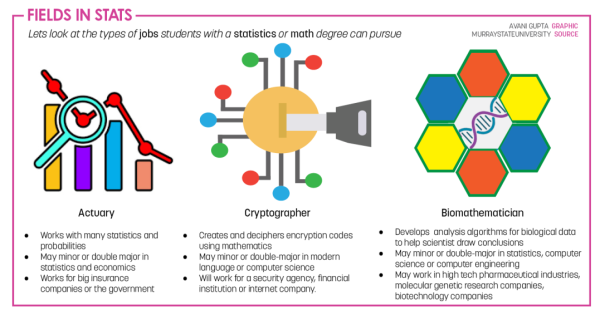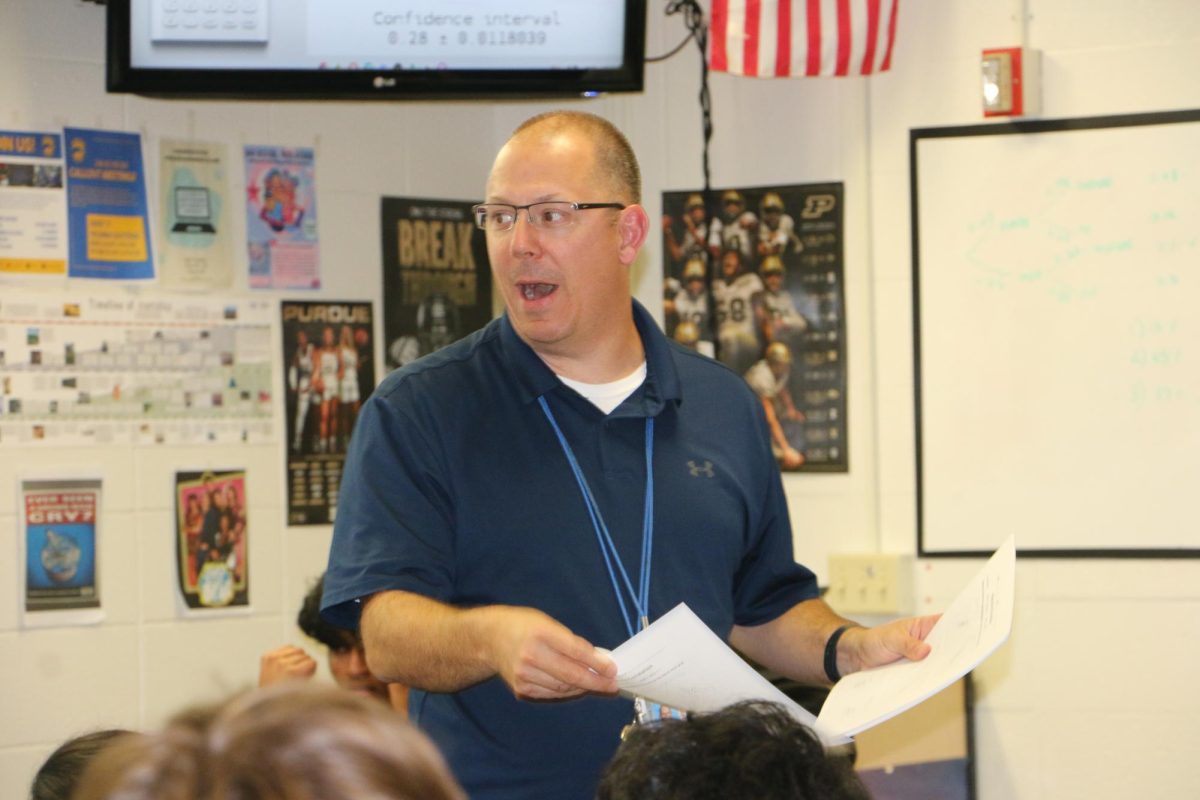In the crowded halls of high schools across the nation, the subjects of mathematics and statistics often find themselves at odds with student enthusiasm. As April unfolds, so does Mathematics and Statistics Awareness Month, providing an opportunity to dive into the dynamics of student perceptions towards these subjects.
According to a recent survey conducted by Pew Research Center, 60% of student participants said they had a distaste for math and statistics. This sentiment, however, doesn’t align with the potential beauty and practicality these subjects can offer, at least according to Matthew Wernke, AP Statistics and Algebra II teacher.
Wernke said there are many different places where mathematics can be used, including things that don’t even involve numbers.
“Mathematics is not just about numbers; it’s a tool that empowers critical thinking, problem-solving and decision-making in various aspects of life,” Wernke said.
Even so, mathematics often struggles to captivate students’ interest. Senior Akul Chinthala said he has struggled with math classes in the past because he feels as though there is a pressure to get every question right.
“I’ve always found math to be a challenge. It feels like a foreign language, and the fear of making mistakes in calculations adds to the stress,” he said. “I think the way math is taught needs a reboot. We need a balance that caters to different learning styles.”
Wernke said, while he was able to understand Chinthala’s point of view, math was practical nonetheless.
“It’s crucial to emphasize the real-world applications of mathematics and statistics. Students should see these subjects not as abstract concepts but as powerful tools that can shape their understanding of the world,” Wernke said.
Research conducted by the National Mathematics Advisory Panel suggests that incorporating real-world examples in the curriculum can significantly impact students’ engagement. In a study involving high school students, those exposed to practical applications of mathematics showed a 30% increase in interest and motivation.

At the heart of the issue lies the perception that math is an isolated, daunting subject. Junior Sriyesh Sirineni said it’s a complicated process that students have to go through to comprehend the difficult concept of mathematics.
“We need to get rid of the myth that you either ‘get’ math or you don’t. It’s a journey of understanding, and everyone has the capacity to appreciate its beauty,” Sirineni said.
One approach gaining traction is the integration of technology to make mathematics and statistics more accessible. Online platforms and interactive tools provide a dynamic learning experience that resonates with the digital-native generation.
“Technology transforms abstract concepts into tangible, interactive experiences. It’s about making math relatable and enjoyable,” Wernke said.
Yet the struggle persists, and Mathematics and Statistics Awareness Month serves as a rallying point for educators, students and the community. Local initiatives at this school are underway to showcase the relevance of these subjects. For example, teachers in the math department, Wernke included, are organizing workshops, inviting guest speakers and implementing interactive learning modules.
“It’s not just about educators. Parents, community members and students themselves play a crucial role in fostering a positive attitude towards mathematics,” Wernke said. “We need to create an environment where curiosity and exploration are encouraged”
Despite the challenges, success stories emerge, demonstrating that a shift in perception is possible. Senior Alex Qu said he discovered his passion for statistics through a school project.
“Once I saw how statistics could reveal patterns and trends in real-world situations, it became fascinating. Now, I’m considering a career in data science or statistics,” Qu said. “The stigma around math stems from the fear of failure. We need to celebrate the small victories, acknowledge that it’s okay to make mistakes, and foster a growth mindset.¨
These sentiments echo the findings of a psychological study conducted by researcher and psychologist Angela Duckworth, emphasizing the role of a growth mindset in academic success. Duckworth’s research suggests that students who view intelligence as malleable are more likely to embrace challenges and persist in the face of setbacks.
As Mathematics and Statistics Awareness Month unfolds, Duckworth said she would like to change how society views these subjects.
She said, “We must recognize that mathematics and statistics are not just subjects to be learned; they are life skills that empower individuals to navigate an increasingly complex world.”

































![AI in films like "The Brutalist" is convenient, but shouldn’t take priority [opinion]](https://hilite.org/wp-content/uploads/2025/02/catherine-cover-1200x471.jpg)









































![Review: “The Immortal Soul Salvage Yard:” A criminally underrated poetry collection [MUSE]](https://hilite.org/wp-content/uploads/2025/03/71cju6TvqmL._AC_UF10001000_QL80_.jpg)
![Review: "Dog Man" is Unapologetically Chaotic [MUSE]](https://hilite.org/wp-content/uploads/2025/03/dogman-1200x700.jpg)
![Review: "Ne Zha 2": The WeChat family reunion I didn’t know I needed [MUSE]](https://hilite.org/wp-content/uploads/2025/03/unnamed-4.png)
![Review in Print: Maripaz Villar brings a delightfully unique style to the world of WEBTOON [MUSE]](https://hilite.org/wp-content/uploads/2023/12/maripazcover-1200x960.jpg)
![Review: “The Sword of Kaigen” is a masterpiece [MUSE]](https://hilite.org/wp-content/uploads/2023/11/Screenshot-2023-11-26-201051.png)
![Review: Gateron Oil Kings, great linear switches, okay price [MUSE]](https://hilite.org/wp-content/uploads/2023/11/Screenshot-2023-11-26-200553.png)
![Review: “A Haunting in Venice” is a significant improvement from other Agatha Christie adaptations [MUSE]](https://hilite.org/wp-content/uploads/2023/11/e7ee2938a6d422669771bce6d8088521.jpg)
![Review: A Thanksgiving story from elementary school, still just as interesting [MUSE]](https://hilite.org/wp-content/uploads/2023/11/Screenshot-2023-11-26-195514-987x1200.png)
![Review: "When I Fly Towards You", cute, uplifting youth drama [MUSE]](https://hilite.org/wp-content/uploads/2023/09/When-I-Fly-Towards-You-Chinese-drama.png)
![Postcards from Muse: Hawaii Travel Diary [MUSE]](https://hilite.org/wp-content/uploads/2023/09/My-project-1-1200x1200.jpg)
![Review: "Ladybug & Cat Noir: The Movie," departure from original show [MUSE]](https://hilite.org/wp-content/uploads/2023/09/Ladybug__Cat_Noir_-_The_Movie_poster.jpg)
![Review in Print: "Hidden Love" is the cute, uplifting drama everyone needs [MUSE]](https://hilite.org/wp-content/uploads/2023/09/hiddenlovecover-e1693597208225-1030x1200.png)
![Review in Print: "Heartstopper" is the heartwarming queer romance we all need [MUSE]](https://hilite.org/wp-content/uploads/2023/08/museheartstoppercover-1200x654.png)




